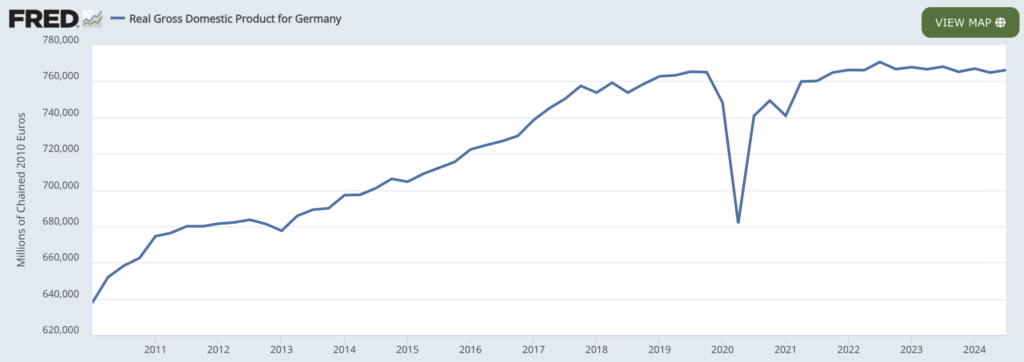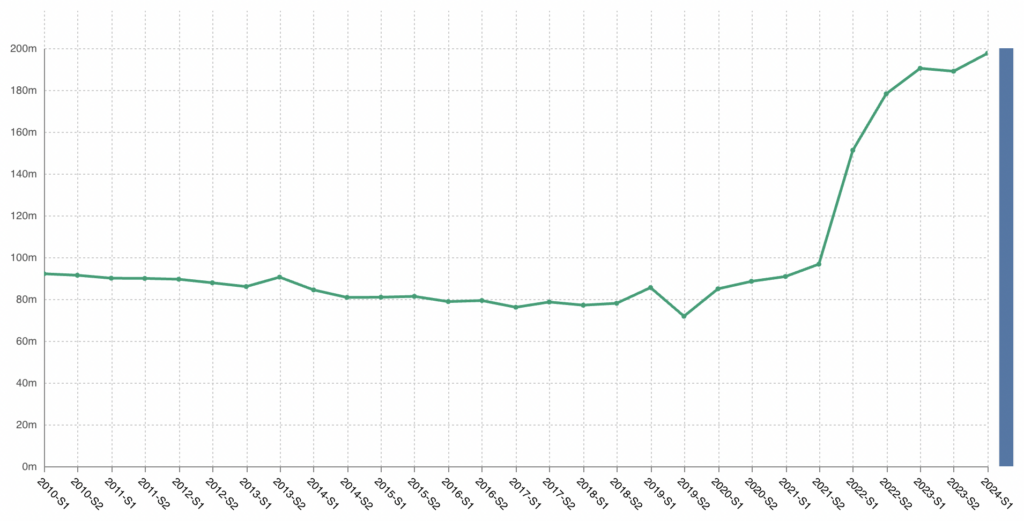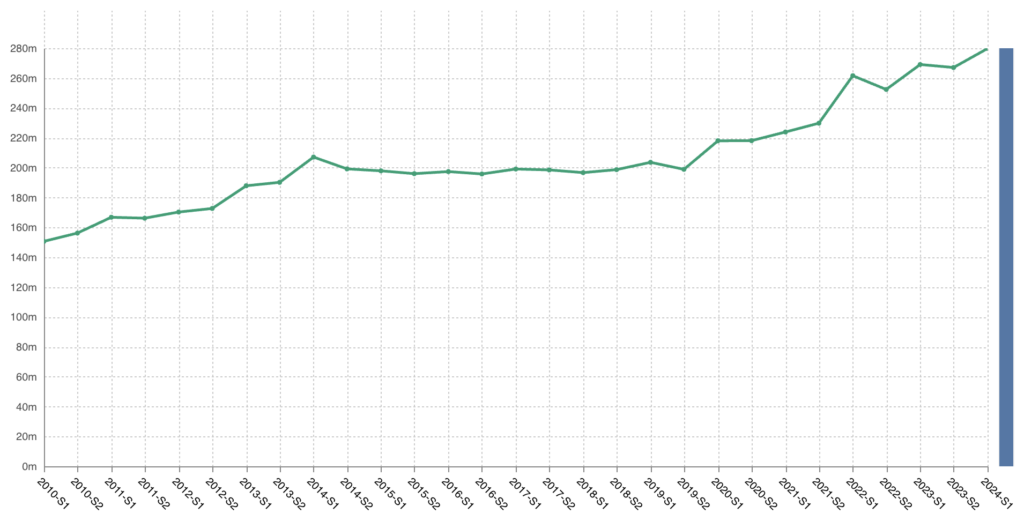The German economy is in crisis. Plants and factories are shuttering. Industrial production is down. And overall GDP hasn’t risen since 2019. According to Andreas Rüter, a corporate consultant interviewed by the Financial Times, the present crisis is of a “completely different order of magnitude” from the dotcom bust, September 11, the financial crisis, the euro crisis and the Covid pandemic.

In the latest piece of bad news, the car manufacturing giant Volkswagen announced that it may have to shut down several German factories for the first time in its 87-year history.
Everyone agrees that a major cause of Germany’s economic troubles is high energy costs. Indeed, the price that industry pays for electricity is about three times higher in Germany than in the US. But why have energy costs risen?
Many people on social media blame the Energiewende (Energy Transition), a policy that involves expanding solar, wind and hydroelectric power, while phasing out the country’s remaining nuclear plants.
There can be little doubt that energy costs would be lower in the absence of the Energy Transition. However, it can’t explain why the economy is suddenly in so much trouble. The Energy Transition was formally announced in 2010 and has been implemented in various stages since then. Yet as the chart above shows, Germany enjoyed robust growth between 2010 and 2019. In fact, industrial production reached an all-time high as recently as 2018.
A related claim is that energy costs have soared because of the decision to close three nuclear plants in April of 2023. But this doesn’t fit the facts either. The chart below shows the price of electricity for non-household users in band IC from the first half of 2010 to the first half of 2024. As you can see, practically all of the increase happened before the three nuclear plants were closed. (Charts for other consumption bands tell a similar story.)

Indeed, most countries in Europe saw a sharp rise in energy costs at exactly the same time, including France, which relies heavily on nuclear power.
The chart below plots the same quantity as above but with taxes and levies included. Here the increase is much less steep, which suggests that fiscal policy has actually been making energy cheaper over the last few years, relative to the period before the increase.

The main reason energy costs have soared is that Germany is no longer buying large quantities of cheap Russian gas. Indeed, practically all of the increase happened between the first half of 2022 and the first half of 2023 – the exact period in which the price of gas spiked owing to the drastic reduction in Russian gas flows. (Europe still gets about 20% of its gas imports from Russia, as compared to 45% before the war.)
In the medium-term, there are things Germany can do to bring down energy costs, like building more LNG terminals, reversing its phase out of nuclear power and shifting to less energy-intensive industries. But in the short-term, there’s nothing it can do to replace large quantities of cheap Russian gas. So the country’s economic troubles will continue for the foreseeable future.
An earlier version of this article stated that Europe gets about 20% of its gas from Russia. This has been corrected.













To join in with the discussion please make a donation to The Daily Sceptic.
Profanity and abuse will be removed and may lead to a permanent ban.
“Disinformation is one of the gravest threats weighing on our democracies,” he says.
This is absolsutely true, but it is the Governments who are using it to push narrative and silence opposition. Ergo, the Governments are the gravest threats to our democracies.
I must say, I’ve had doubts about how far Musk will go in his ‘free speech’ campaign. I dont think it reasonable for him to withdraw from the EU, so I expect he will sail somewhere close to the line, without actually crossing it.
Withdrawing from the EU might get people’s attention, though most likely people would blame Musk not the EU.
Musk can’t take on the EU by himself.
If the population were ready to see him as a champion and rally behind him to fight for free speech, then obviously he could.
But we’ve seen how spineless the population is. Many of them have offered up their children as guinea pigs for untested jabs to appease a menacing state bureaucracy, so…
I think it would do more harm than good for him to take that step, yes.
There’s little support for freedom of speech, at least in the UK and Europe, among people I speak to. People will tell you they like the idea, but when you start quoting types of speech (“hate”, “misinformation”) and ask if they should be allowed they will tell you “no of course not”.
It would also probably be suicidal.
I don’t see Twitter’s withdrawal from the EU’s code of practice an empty gesture. It is a signal. Now, one can debate what the signal is.
It might just be to try to look good. Or it might be a signal of measured defiance which says – ok, you might be forcing me to comply by turning a code into law, but I will t least, with my gesture, show you I don’t agree with it or like it.
I don’t know how committed Musk really is to free speech. I doubt few do. But if one assumes he is, how he plays his cards is anything but simple. It would be fiendishly complicated to try to runTwitter as a free speech platform in today’s regulatory environment, if that was what one wanted to do, without being destroyed by the heavy hand of ever more oppressive and authoritarian states.
My guess is that he’s trying to do his best, but I am ready to be disappointed and discover I’ve been naive.
I’ve said it before and I will say it again – Musk doesn’t give a flying duck about Free Speech.
Surely Twitter need to replace the display of offending content with a message saying banned in the EU. If people are really interested they can use a VPN to avoid this. If enough people are annoyed then there will be push back.
The EU appears not to want Twitter being what it is but wants something else instead.
The EU should build its own ‘service’ as it wants it to be – I’m sure they could make it just as popular eventually.
I hope Elon has the power and the balls to withdraw Twitter from the EU territory.